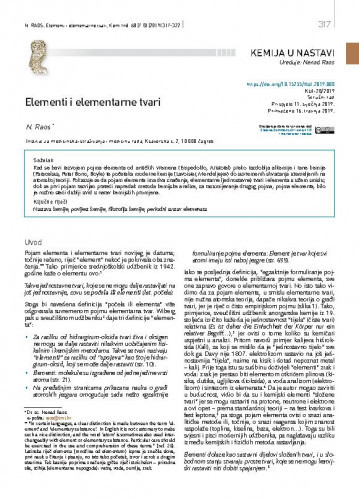Rad se bavi razvojem pojma elementa od antičkih vremena (Empedoklo, Aristotel) preko razdoblja alkemije i rane kemije (Paracelsus, Petar Bono, Boyle) te početaka moderne kemije (Lavoisier, Mendeljejev) do suvremenih shvaćanja utemeljenih na atomskoj teoriji. Pokazuje se da pojam elementa ima dva značenja, elementarne (jednostavne) tvari i elementa u užem smislu; dok se prvi pojam razvijao prateći napredak metoda kemijske analize, za razumijevanje drugog pojma, pojma elementa, bilo je nužno steći dublji uvid u narav kemijskih promjena.; The concept of element in the broader sense has two meanings. The first is quite practical: the product of chemical analysis which cannot be further decomposed (elementary or simple substance). The second is speculative: the part of a compound which remains unchanged by chemical reaction. However, the concept of element has been operative even before the advent of modern chemistry, finding its representation in classical Greek elements (water, earth, air, and fire) and tria prima of iatrochemists (mercury, salt, and sulphur). A short history of the concept of element is presented, with special emphasis on the natural philosophy of Empedocles, Aristotle, Paracelsus, Petrus Bonus, as well as on the more modern views on the nature of elements contemplated by Boyle, Lavoisier, and Mendeleev. The concept of element in the light of atomic theory is briefly discussed, especially regarding the large number of carbon alotrophs.
Sažetak

 Kemija u industriji : 68,7-8(2019) / glavni i odgovorni urednik Nenad Bolf.
Kemija u industriji : 68,7-8(2019) / glavni i odgovorni urednik Nenad Bolf.